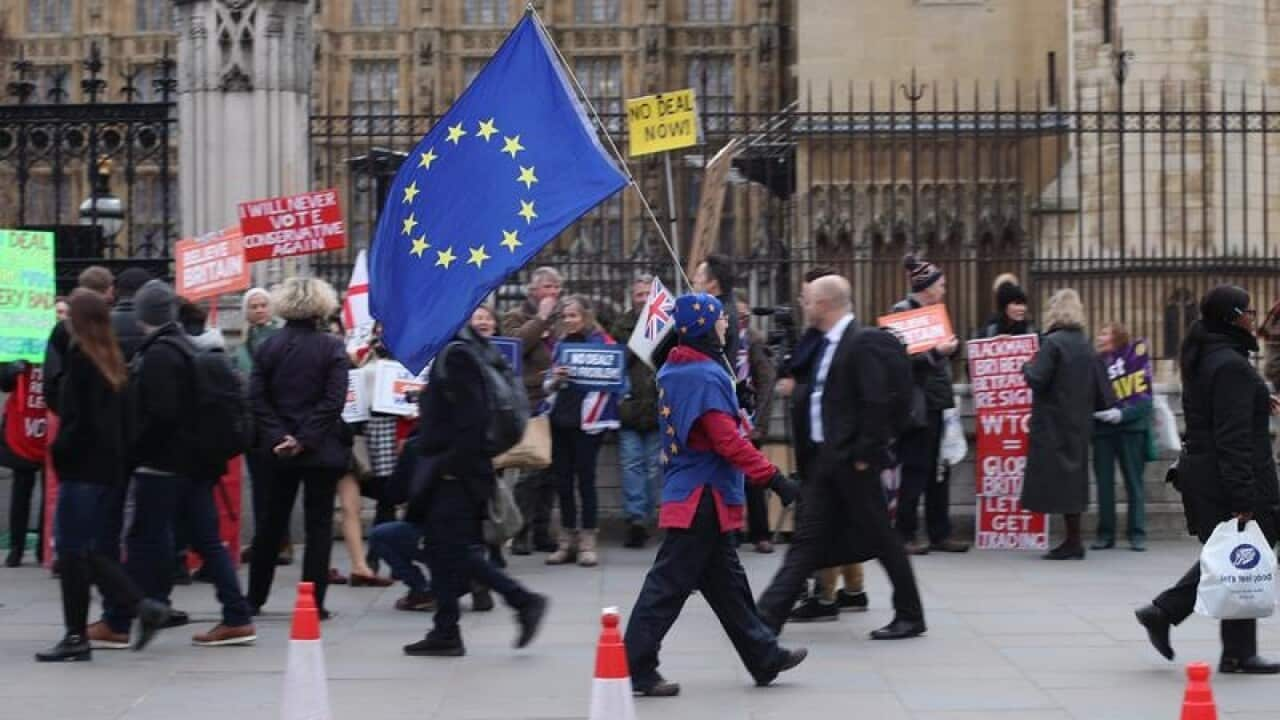Lawmakers voted by 321 to 278 in favor of a motion that ruled out a potentially disorderly ‘no-deal’ Brexit under any circumstances.
It went further than the government’s own planned motion, which noted that parliament did not want to leave without a deal on March 29, the leaving date set down in law, but stressed that the default legal position was to leave without a deal unless one was ratified by parliament.
While the approved motion has no legal force and ultimately may not prevent a no-deal exit after a possible delay, it carries considerable political force, especially as it demonstrated a substantial rebellion by members of May’s own party.
After two-and-a-half years of negotiations and two failed attempts to pass a Brexit deal proposed by May, the vote against a no-deal exit still leaves undecided how, when and on what terms Britain will leave the club it joined in 1973.
After lawmakers crushed her deal for a second time on Tuesday, May said it was still the best option for leaving in an orderly fashion.
The pound spiked to the day’s high and was headed for its biggest daily gain in 2019.
As the United Kingdom’s three-year Brexit crisis spins toward its finale, diplomats and investors see four main options: a delay, May’s deal passing at the last minute, an accidental no-deal exit or another referendum.
British PM proposes new vote on Brexit deal by March 20
British Prime Minister Theresa May's government on Wednesday set out plans for a third parliamentary vote on her Brexit deal with the EU to be held by March 20.
In a proposal to be voted on by MPs on Thursday, the government states that if parliament has not approved the deal by that date it will ask the EU for an extension.
Amendment to not leave in any scenario
Ahead of the main motion, British lawmakers on Wednesday rejected leaving the European Union without a deal in any scenario, in a non-binding vote which will increase pressure on Prime Minister Theresa May to rule out a 'no-deal' exit.
Lawmakers voted by 312 to 308 in favour of a Amendment A, a proposal put forward by a group of lawmakers calling on the government to rule out a no deal exit.
It went further than the government's motion, which notes that parliament does not want to leave without a deal on March 29 and that the default legal position is to leave without a deal unless one is ratified by parliament.
Amendment A overrides the government's motion.
The successful amendment was put forward by Yvette Cooper. The government's original motion only ruled out leaving without a deal on 29 March
After two-and-a-half years of negotiations and two failed attempts to pass her deal, parliament are voting to reject a no-deal exit, which investors feared would spook financial markets, dislocate supply chains and damage the world's fifth largest economy.
MPs began voting shortly after 7pm local time on Wednesday on a government motion stating that parliament rejects leaving the EU without a deal on March 29 - but notes that leaving without a deal remains the legal default unless a deal is agreed, allowing for it to happen at a later date.
Environment Secretary Michael Gove, standing in for May after she lost her voice in earlier debates, told parliament that tens of thousands of businesses were not prepared for a no-deal exit.
Wednesday's motion has no legal force and ultimately does not prevent a no-deal exit, however, if MPs support it as expected, then they will get a vote on Thursday on whether to ask the EU to delay Brexit, probably by months.
Ahead of Wednesday's vote, the pound headed for its biggest daily rise in 2019 as investors bet that parliament would resoundingly vote against a no-deal Brexit.
After MPs crushed her deal for a second time on Tuesday, May said it was still the best option for leaving in an orderly fashion.
"I want to leave the European Union with a good deal, I believe we have a good deal," she told parliament.
May said the government would not instruct her Conservative Party's MPs how to vote on its motion.
But it did forbid them to back a proposed cross-party amendment to the motion that sought to rule out a no-deal exit under any circumstances, leading to the amendment being withdrawn.
A remaining amendment calls on the government to delay Brexit until May 22 to give it time to put in place measures to mitigate the consequences of leaving the EU without a deal.
As the United Kingdom's three-year Brexit crisis spins towards its finale, diplomats and investors see four main options: a delay, May's deal passing at the last minute, an accidental no-deal exit or another referendum.
Northern Ireland's Democratic Unionist Party, which props up May's government, said her Brexit deal was "dead" and should not be put to parliament for a third time.
"We have not given up the goal of an orderly exit," German Chancellor Angela Merkel said, "but yesterday's events mean the options have become narrower."

